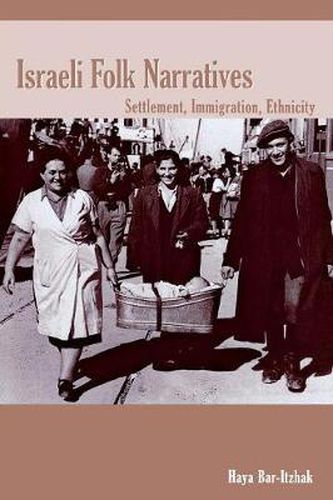Readings Newsletter
Become a Readings Member to make your shopping experience even easier.
Sign in or sign up for free!
You’re not far away from qualifying for FREE standard shipping within Australia
You’ve qualified for FREE standard shipping within Australia
The cart is loading…






This title is printed to order. This book may have been self-published. If so, we cannot guarantee the quality of the content. In the main most books will have gone through the editing process however some may not. We therefore suggest that you be aware of this before ordering this book. If in doubt check either the author or publisher’s details as we are unable to accept any returns unless they are faulty. Please contact us if you have any questions.
The goals and challenges that face the people of Israel are vividly illustrated by the country’s many folk stories. Here Haya Bar-Itzhak presents these tales - gathered from the early settlers of the kibbutz, from immigrants who arrived in Israel after independence, and from ethnic groups - to create a panoramic view of a fascinatingly complex society. Creating stories set in the past, even the recent past, is a way for societies to express their problems, adversities, yearnings, and hopes. Bar-Itzhak finds this true among inhabitants of the kibbutz, who find their society at a crossroads as a result of changes in Israeli society at large. She reveals the symbolic dimensions of their stories - some dealing with the death of young soldiers (sacrificed sons) in battle - as pointing to the complexity of a local culture that expresses the ethos of Labor Zionism. In a section dealing with the folklore of immigrants, Bar-Itzhak focuses on the narratives of Yemenite Jews and Polish Jews. Their stories express their traumatic meeting with Israeli society while providing a means for coming to grips with it. The final section, dealing with ethnic folklore of Moroccan Jews, explores the wonder tale through the perspective of disabled and elderly storytellers, who in the language of their community seek to defend their own values and norms, and examines the saints’ legends and the body language usually employed in the telling of them. Throughout, the author illuminates the unique challenge of experiencing ethnicity as Jews vis-a-vis other Jews.
Israeli Folk Narratives
combines new data with insightful analyses. Anyone interested in folk stories and Israeli culture will be enlightened by this sensitive, thought-provoking book.
$9.00 standard shipping within Australia
FREE standard shipping within Australia for orders over $100.00
Express & International shipping calculated at checkout
This title is printed to order. This book may have been self-published. If so, we cannot guarantee the quality of the content. In the main most books will have gone through the editing process however some may not. We therefore suggest that you be aware of this before ordering this book. If in doubt check either the author or publisher’s details as we are unable to accept any returns unless they are faulty. Please contact us if you have any questions.
The goals and challenges that face the people of Israel are vividly illustrated by the country’s many folk stories. Here Haya Bar-Itzhak presents these tales - gathered from the early settlers of the kibbutz, from immigrants who arrived in Israel after independence, and from ethnic groups - to create a panoramic view of a fascinatingly complex society. Creating stories set in the past, even the recent past, is a way for societies to express their problems, adversities, yearnings, and hopes. Bar-Itzhak finds this true among inhabitants of the kibbutz, who find their society at a crossroads as a result of changes in Israeli society at large. She reveals the symbolic dimensions of their stories - some dealing with the death of young soldiers (sacrificed sons) in battle - as pointing to the complexity of a local culture that expresses the ethos of Labor Zionism. In a section dealing with the folklore of immigrants, Bar-Itzhak focuses on the narratives of Yemenite Jews and Polish Jews. Their stories express their traumatic meeting with Israeli society while providing a means for coming to grips with it. The final section, dealing with ethnic folklore of Moroccan Jews, explores the wonder tale through the perspective of disabled and elderly storytellers, who in the language of their community seek to defend their own values and norms, and examines the saints’ legends and the body language usually employed in the telling of them. Throughout, the author illuminates the unique challenge of experiencing ethnicity as Jews vis-a-vis other Jews.
Israeli Folk Narratives
combines new data with insightful analyses. Anyone interested in folk stories and Israeli culture will be enlightened by this sensitive, thought-provoking book.